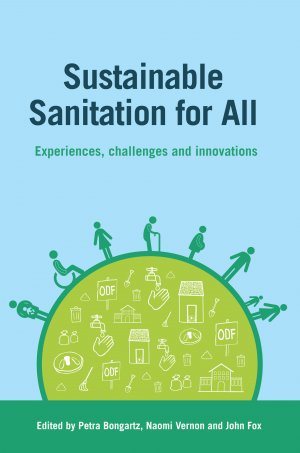Sustainable Sanitation for All: Experiences, challenges, and innovations
 |
livre Jun 2016 ; 346 pages
Aut. Petra Bongartz & Naomi Vernon & John Fox
Ed. Practical Action - Rugby ; Isbn: 978-1-85339-927-5
Téléchargeable sous format: PdF
Téléchargeable chez l'éditeur
Page de présentation d'un éditeur
Abstract:
Great strides have been made in improving sanitation in many developing countries. Yet, 2.4 billion people worldwide still lack access to adequate sanitation facilities and the poorest and most vulnerable members of society are often not reached and their specific needs are not met. Moreover, sustainability is currently one of the key challenges in CLTS and wider WASH practice, subsuming issues such as behaviour change, equity and inclusion, physical sustainability and sanitation marketing, monitoring and verification, engagement of governments, NGOs and donors, particularly after open defecation free (ODF) status is reached, and more. Achievement of ODF status is now recognised as only the first stage in a long process of change and sanitation improvement, with new challenges emerging every step of the way, such as how to stimulate progress up the sanitation ladder, how to ensure the poorest and marginalised are reached, or how to maintain and embed behaviour change.
There have been several useful studies on sustainability that have highlighted some of these different aspects as well as the complexities involved. This book develops these key themes by exploring current experience, practices, challenges, innovations and insights, as well as identifying a future research agenda and gaps in current knowledge. Describing the landscape of sustainability of CLTS and sanitation with reference to the Sustainable Development Goals (SDGs) and through examples from Africa and Asia, the book captures a range of experiences and innovations from a broad range of institutions and actors within the WASH sector, and attempts to make recommendations and practical suggestions for policy and practice for practitioners, funders, policy-makers and governments. Contents:
Prelims - Sustainable Sanitation for All
CHAPTER 1: Going beyond open defecation free
PART I: Mapping the territory
CHAPTER 2: Sanitation in Bangladesh: revolution, evolution, and new challenges
CHAPTER 3: Building environments to support sustainability of improved sanitation behaviours at scale: levers of change in East Asia
CHAPTER 4: Strengthening post-ODF programming: reviewing lessons from sub-Saharan Africa
PART II: Physical sustainability
CHAPTER 5: CLTS and sanitation marketing: aspects to consider for a better integrated approach
CHAPTER 6: User-centred latrine guidelines – integrating CLTS with sanitation marketing: a case study from Kenya to promote informed choice
CHAPTER 7: Sanitation infrastructure sustainability challenges case study: Ethiopia
CHAPTER 8: The long-term safe management of rural shit
PART III: Post-ODF engagement and monitoring
CHAPTER 9: Beyond ODF a phased approach to rural sanitation development
CHAPTER 10: Roles and responsibilities for post-ODF engagement: building an enabling institutional environment for CLTS sustainability
CHAPTER 11: Who is managing the post-ODF process in the community? A case study of Nambale sub-county in western Kenya1
CHAPTER 12: Tools for embedding post-ODF sustainability: experiences from SNV Nepal
CHAPTER 13: Certification of open defecation free status: emerging lessons from Kenya
PART IV: How to ensure equity and inclusion
CHAPTER 14: Promoting choice: smart finance for rural sanitation development
CHAPTER 15 Putting the hardest to reach at the heart of the Sustainable Development Goals
CHAPTER 16: Leave no one behind: equality and non-discrimination in sanitation and hygiene
PART V: How to transform social norms
CHAPTER 17: Purity, pollution, and untouchability: challenges affecting the adoption, use, and sustainability of sanitation programmes in rural India
CHAPTER 18: Using social norms theory to strengthen CATS impact and sustainability
CHAPTER 19 Conclusion: gaps in knowledge and further research needs
Mots clefs: |
assainissement (CI) (DT) (OP) (ope) , ATPC Assainissement Total Piloté par la Communauté (CI) (DT) (OP) (ope) |
Editeur/Diffuseur: |
|
Practical Action - Rugby - Royaume Uni |
En cas de lien brisé, nous le mentionner à communication@pseau.org